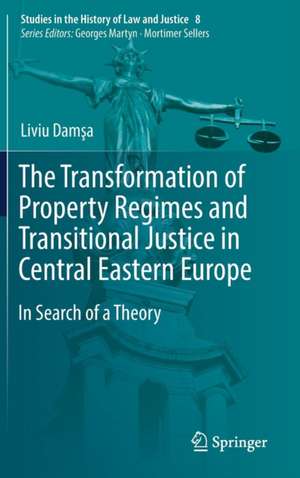The Transformation of Property Regimes and Transitional Justice in Central Eastern Europe: In Search of a Theory: Studies in the History of Law and Justice, cartea 8
Autor Liviu Damşaen Limba Engleză Hardback – 9 ian 2017
The book also argues that, for a more complete theorisation of (post-communist) restitution, the transformations of property in post-communist societies ought to be studied in a more holistic way. The main legal vehicles used for such transformations, privatisation and restitution, should not be studied separately and in abstract, but in their reciprocal relationship, and in connection to the dimension of justice which each could achieve. Finally, the book integrates ‘privatisation’ in a theory of post-communist transformation of property.
| Toate formatele și edițiile | Preț | Express |
|---|---|---|
| Paperback (1) | 891.96 lei 6-8 săpt. | |
| Springer International Publishing – 29 apr 2018 | 891.96 lei 6-8 săpt. | |
| Hardback (1) | 897.95 lei 6-8 săpt. | |
| Springer International Publishing – 9 ian 2017 | 897.95 lei 6-8 săpt. |
Din seria Studies in the History of Law and Justice
- 18%
 Preț: 2111.92 lei
Preț: 2111.92 lei - 18%
 Preț: 1006.55 lei
Preț: 1006.55 lei - 20%
 Preț: 752.77 lei
Preț: 752.77 lei - 18%
 Preț: 778.45 lei
Preț: 778.45 lei - 15%
 Preț: 642.51 lei
Preț: 642.51 lei - 18%
 Preț: 1001.50 lei
Preț: 1001.50 lei - 18%
 Preț: 1120.81 lei
Preț: 1120.81 lei -
 Preț: 436.57 lei
Preț: 436.57 lei - 18%
 Preț: 727.31 lei
Preț: 727.31 lei - 18%
 Preț: 1116.26 lei
Preț: 1116.26 lei - 18%
 Preț: 784.92 lei
Preț: 784.92 lei - 18%
 Preț: 724.00 lei
Preț: 724.00 lei - 18%
 Preț: 1006.72 lei
Preț: 1006.72 lei - 18%
 Preț: 994.72 lei
Preț: 994.72 lei - 20%
 Preț: 563.41 lei
Preț: 563.41 lei -
 Preț: 351.88 lei
Preț: 351.88 lei - 18%
 Preț: 941.68 lei
Preț: 941.68 lei - 24%
 Preț: 1139.37 lei
Preț: 1139.37 lei - 18%
 Preț: 1118.30 lei
Preț: 1118.30 lei - 18%
 Preț: 779.89 lei
Preț: 779.89 lei - 18%
 Preț: 893.40 lei
Preț: 893.40 lei - 20%
 Preț: 577.43 lei
Preț: 577.43 lei - 15%
 Preț: 655.78 lei
Preț: 655.78 lei - 18%
 Preț: 1009.70 lei
Preț: 1009.70 lei -
 Preț: 428.84 lei
Preț: 428.84 lei - 24%
 Preț: 1075.33 lei
Preț: 1075.33 lei - 18%
 Preț: 951.77 lei
Preț: 951.77 lei
Preț: 897.95 lei
Preț vechi: 1095.07 lei
-18% Nou
Puncte Express: 1347
Preț estimativ în valută:
171.88€ • 186.76$ • 144.47£
171.88€ • 186.76$ • 144.47£
Carte tipărită la comandă
Livrare economică 21 aprilie-05 mai
Preluare comenzi: 021 569.72.76
Specificații
ISBN-13: 9783319485287
ISBN-10: 3319485288
Pagini: 333
Ilustrații: XXIII, 311 p.
Dimensiuni: 155 x 235 x 19 mm
Greutate: 0.64 kg
Ediția:1st ed. 2016
Editura: Springer International Publishing
Colecția Springer
Seria Studies in the History of Law and Justice
Locul publicării:Cham, Switzerland
ISBN-10: 3319485288
Pagini: 333
Ilustrații: XXIII, 311 p.
Dimensiuni: 155 x 235 x 19 mm
Greutate: 0.64 kg
Ediția:1st ed. 2016
Editura: Springer International Publishing
Colecția Springer
Seria Studies in the History of Law and Justice
Locul publicării:Cham, Switzerland
Cuprins
1 Acknowledgements.- 2 Abstract.- 3 Table Of Cases.- 4 Table Of Legislation.- 5 Introduction.- 6 Post-Communist Property Transformations And Transitional Justice. Some Historical, Legal And Philosophical Issues.- 7 Justice, Property And Law In Post-Communist Transformations.- 8 Property In The Communist And Post-Communist Eras.- 9 The Post-Communist Restitution Concept And Its Challenges.- 10 Restitution As Correction For “Historical Injustice.- 11 “Restitution In Action” In Post-Communist Central Eastern Europe. The Cases Of Romania And Poland.- 12 Conclusions.- 13 Selective Bibliography.
Recenzii
“This is an important book, providing valuable material about capitalist transitions and legacies in postcommunist societies and economies. It offers a distinctive framework for theorising post-communist privatisation and restitution. The author provides grounds for a reconsideration of property regime transformation in transitional justice theory.” (Rafał Riedel, Europe-Asia Studies, Vol. 70 (3), April,2018)
Textul de pe ultima copertă
This volume examines the property transformations in post-communist Central Eastern Europe (CEE) and focuses on the role of restitution and privatisation in such transformations. It argues that the theorisation of ‘restitution’ in post-communist CEE is incomplete in the transitional justice scholarship and in the literature on correction of historical wrongs.
The book also argues that, for a more complete theorisation of (post-communist) restitution, the transformations of property in post-communist societies ought to be studied in a more holistic way. The main legal vehicles used for such transformations, privatisation and restitution, should not be studied separately and in abstract, but in their reciprocal relationship, and in connection to the dimension of justice which each could achieve. Finally, the book integrates ‘privatisation’ in a theory of post-communist transformation of property.
The book also argues that, for a more complete theorisation of (post-communist) restitution, the transformations of property in post-communist societies ought to be studied in a more holistic way. The main legal vehicles used for such transformations, privatisation and restitution, should not be studied separately and in abstract, but in their reciprocal relationship, and in connection to the dimension of justice which each could achieve. Finally, the book integrates ‘privatisation’ in a theory of post-communist transformation of property.
Caracteristici
Offers a more complete theorisation of "restitution" than currently found in the literature Analyses the measures transforming the regime of property in post-communist CEE countries Addresses the distributional characteristics of transformation of property in post-communist CEE and their theoretical implications for transitional justice
